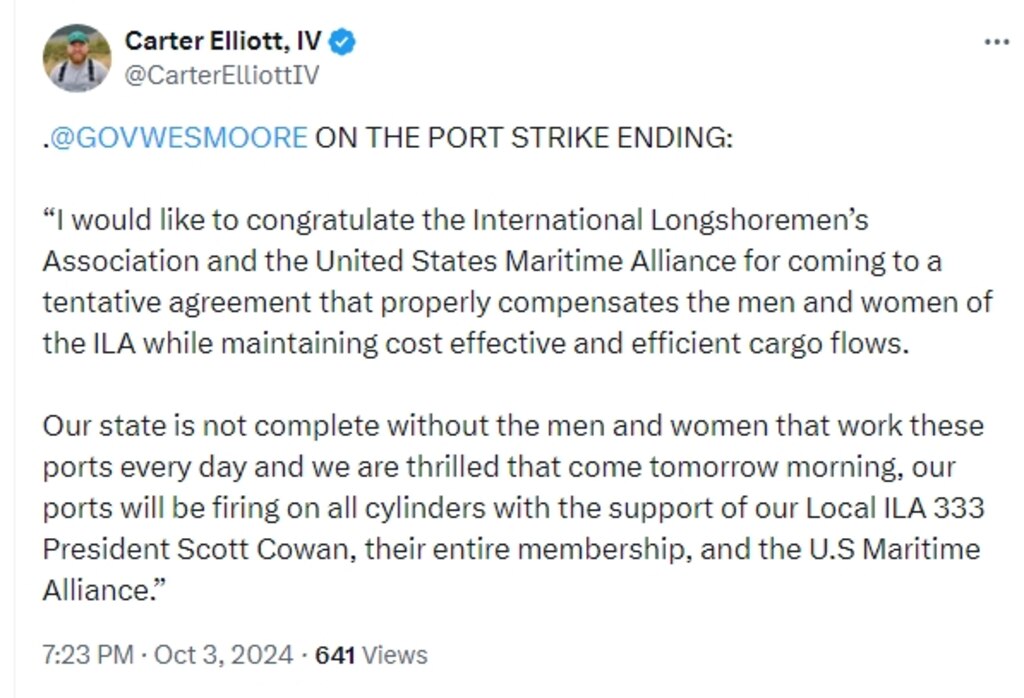The Port of Baltimore reopened Friday morning, a day after the union representing 45,000 striking U.S. dockworkers at East and Gulf Coast ports reached a deal to suspend their strike until Jan. 15.
The deal reached Thursday night allows to the union and port management time to negotiate a new contract.
The union, the International Longshoremen’s Association, said the agreement covers slightly more than three months and workers were cleared to return to work, according to a statement issued by the union.
The new agreement will allow the union and the U.S Maritime Alliance, which represents the shippers and ports, time to negotiate a new six-year contract. The agreement reached Thursday evening was on wages; the union said it will allow both sides “to negotiate all other outstanding issues.”
International Longshoreman’s Association Local 333 President Scott Cowan told The Banner that while the contract and end of the strike is a win, the fight is not quite over.
”It’s definitely a win,” he said. “They got a few outstanding issues to work out over the next several months, and then it’ll be all buttoned-up.”
Cowan told WJZ that under the deal, workers will get a 61.5% raise over six years and the two sides will work out language for job protection against positions being automated.
Cowan added that the strike had “a lot of unity” and support from the community over the last few days. As workers broke down their union refuge at the Dundalk Marine Terminal just before 8 p.m., a worker yelled out of their car window as Cowan did media interviews: “Best union president on the East Coast!”
Another worker, who did not give a name, asked fellow union members if they wanted to take the strike signs home as souvenirs with sentimental value.
In a statement on its website, the Maryland Department of Transportation Port Administration congratulated the longshoremen for reaching an agreement and avoiding a prolonged work stoppage.
“When strikes occur, even for a short time, the impacts are significant,” the agency said in a statement.
Gov. Wes Moore, in a post to X, congratulated the port workers on reaching the agreement.
“I would like to congratulate the International Longshoremen’s Association and the United States Maritime Alliance for coming to a tentative agreement that properly compensates the men and women of the ILA while maintaining cost effective and efficient cargo flows,” Moore said in a statement issued through a spokesman.

State Sen. Bill Ferguson tweeted shortly after the announcement Thursday evening that the settlement was “great news.”
“Even better, sounds like final negotiated deal is a great result for Port workers - meaningful raises and reasonable protections against full automation. Excellent for #PortofBaltimore & men and women of @ILA953 @ILALocal333 ILA 1429!” Ferguson said in the post.
In a post on X, U.S. Sen. Chris Van Hollen, who joined the longshoremen on the picket line, called the settlement good news and said he was optimistic a final deal will be reached.
“This is good news that’ll get vital ports — including the Port of Baltimore — back up & running,” Van Hollen said.
The union went on strike early Tuesday after its contract expired, in a dispute over pay and the automation of tasks at the ports from Maine to Texas. The strike came at the peak of the holiday shopping season at 36 ports that handle about half the cargo from ships coming into and leaving the United States.
The walkout raised the risk of shortages of goods on store shelves if it lasted more than a few weeks. But most retailers had stocked up or shipped items early in anticipation of the work stoppage.
The union’s membership won’t need to vote on the temporary suspension of the strike. Until Jan. 15, the workers will be covered under the old contract, which expired Sept. 30.
“With the grace of God, and the goodwill of neighbors, it’s gonna hold,” President Joe Biden said of the agreement Thursday night.
The union has been demanding a complete ban on the use of automation at the ports, which they see as a threat to their jobs. Both sides also have been divided on the issues of pension contributions and the distribution of royalties paid on containers that are moved by workers.
At the Port of Baltimore, more than 100 people picketed along Broening Highway outside the marine terminals, calling for higher wages and an end to automation at the ports. They wore neon yellow and orange work vests and held signs saying, “Machines don’t feed families” and “No work without a fair contract.”
The strike came just months after the port reopened following the Key Bridge collapse in March.
It marked the first time in nearly 50 years that East Coast longshoremen have been on strike. Every port from Texas to Maine was affected. The Port of Baltimore is a mixture of privately and publicly owned marine terminals along the Patapsco River and has roughly 2,000 union dockworkers.
Baltimore’s port is one of the nation’s busiest, and the longshoremen play a critical role in the import and export of cars, farm machinery, consumer goods and much more.
Without the longshoremen to load and unload goods, other work at the port ground to a halt for three days. Some companies routed goods to West Coast ports ahead of a potential East Coast strike.
“I need to take it easy. I gotta rest up. I’m tired — after the bridge collapsing and this,” Cowan said.
Associated Press writer Tom Krisher contributed to this report.





Comments
Welcome to The Banner's subscriber-only commenting community. Please review our community guidelines.